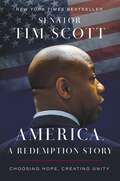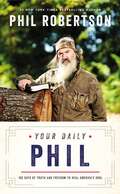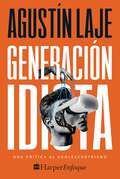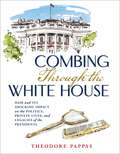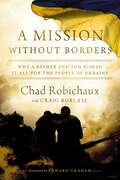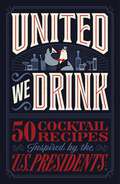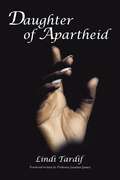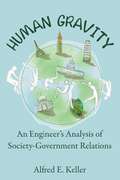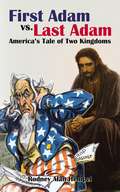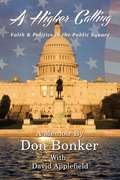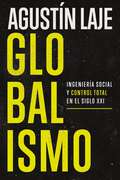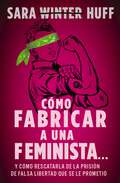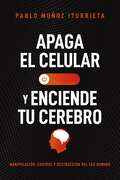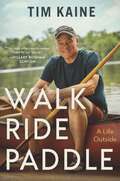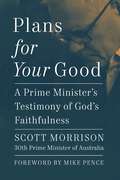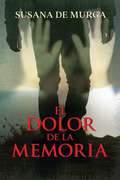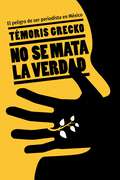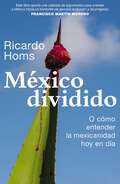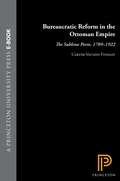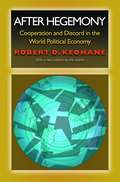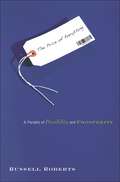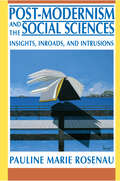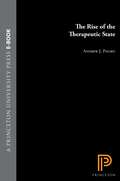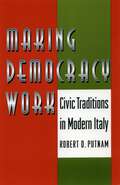- Table View
- List View
America, a Redemption Story: Choosing Hope, Creating Unity
by Senator Tim ScottThe American Dream isn&’t a thing of the past, but a miracle of the present.Now more than ever it&’s easy to focus on the divisions that plague our nation. It may seem as if our best days are behind us, but bestselling author and senator Tim Scott believes we have yet to realize the fullness of our identity. We are in the midst of a story that&’s still unfolding. And beautiful opportunities await.In this powerful memoir, Scott recounts formative events of his life alongside the inspiring stories of other Americans who have risen above hardship and embodied the values that make our nation great. Together these personal and inspirational accounts call readers to embracethe mountaintops as well as the valleys on the journey to a more perfect union;a path marked by optimism, hope, and resolve; anda future characterized by endurance, unity, and strength.Both a clear-eyed reckoning with our nation&’s failures and an ode to its accomplishments, America, a Redemption Story issues a clarion call for all of us to rise courageously to the greatness within our reach.
Your Daily Phil: 100 Days of Truth and Freedom to Heal America's Soul
by Phil RobertsonA daily dose of truth, morality, and biblical wisdom from A&E Duck Dynasty patriarch Phil Robertson in this 100-day devotional.There is a war being waged on the soul of America, but Phil Robertson believes there is hope. In this compilation of 100 days of readings taken from his bestselling books The Theft of America&’s Soul and Jesus Politics, now with newly added prayers and Bible verses, he shows how Americans can turn away from the lies of the devil and embrace the life-giving, healing, and wholly transforming love of God, helping to bring the kingdom of heaven to our homes, neighborhoods, churches, communities, and country. These 100 devotionals cover God-honoring principles, includingcommitting to the life of Christ and his words;understanding the importance of kindness, respect, hard work, and financial stewardship;enjoying God&’s creation—Earth, animals, and each other.Written with captivating storytelling and unflinching honesty, this book is a call for Christians to wake up and use their time, talents, resources, influence, and votes to protect and advance the policies of King Jesus—the only policies that will truly heal the soul of America.
Generación idiota: Una crítica al adolescentrismo
by Agustin LajeGeneración idiota nos ofrece una inmersión profunda en la desaparición de la sociedad intergeneracional y el auge de la mentalidad adolescente, que ha causado un gran daño a la política y a la sociedad.En la continuación de su best seller internacional La batalla cultural, el afamado escritor, politólogo y conferencista Agustín Laje presenta Generación idiota: Una crítica al adolescentecentrismo. Según Agustín, las ideologías centradas en la adolescencia del siglo XXI están en auge. Como resultado, los adolescentes están gobernando el mundo. Rigen la forma de la cultura, estructuran la forma de la política, inspiran los cambios de nuestro lenguaje, imponen sus preferencias estéticas y dominan el imaginario postindustrial y el sistema de consumo. Las instituciones básicas, como la familia, también están fuera de lugar en estas generaciones adolescentes.El libro está dividido en cinco capítulosCapítulo 1 – Una investigación sobre el papel y el poder de los ancianos a lo largo de la historia y su caída con el advenimiento de las sociedades modernasCapítulo 2 – La caracterización y explicación de la "sociedad adolescente", el idiota posmoderno, y el gran tema de la identidad que está omnipresente y arraigado en nuestra sociedadCapítulo 3 – El papel de la moda, el entretenimiento y la tecnología digital y cómo han afectado y moldeado la cultura y la política del siglo XXICapítulo 4 – La expropiación del poder de la familia en la sociedad, la omnipresencia del adoctrinamiento en la educación y el devastador poder socializador de los medios de comunicación de masasCapítulo 5 – Agustín cierra ofreciendo un modelo de rebelión muy diferente para la Nueva Derecha (a la que vuelve a expresar su apoyo), cómo escapar de la idiotez política, y rebelarse de verdad contra el sistema establecido.Si estás cansado del adoctrinamiento más descarado de los medios de comunicación, las escuelas, las universidades y, sobre todo, de nuestros hijos, querrás leer Generación idiota, en la que Laje ofrece un modelo particular de rebelión para la Nueva Derecha. Escapemos juntos el idiotismo político y rebelarnos contra el sistema establecido. ¡Manos a la obra!Idiot GenerationIdiot Generation offers a deep dive into the demise of the transgenerational society and the rise of the adolescent mentality, which has caused great damage to politics and society.In the follow-up to his international bestseller The Culture Battle, famed writer, political scientist, and lecturer Agustín Laje presents Idiot Generation: A Critique of Adolescentcentrism.According to Agustin, adolescent-centered ideologies of the 21st century are rampant. As a result, adolescents are ruling the world. They govern the shape of culture, structure the shape of politics, inspire the changes in our language, impose their aesthetic preferences, and dominate post-industrial imagery and the consumer system. Basic institutions, such as the family, are also out of place in these adolescent generations.
Combing Through the White House: Hair and Its Shocking Impact on the Politics, Private Lives, and Legacies of the Presidents
by Theodore PappasDiscover a fascinating and novel look at the U.S. presidents, the first families, and American history—all through the lens of hair. With meticulous detail, engaging storytelling, and full-color visuals, encyclopedia editor Theodore Pappas combs through American history, teasing out long-forgotten and little-known ways that hair has influenced the presidency and the public and private lives, personal scandals, and tragedies of the men and women who have occupied the White House.Go deep into the history of such topics as:Abraham Lincoln's famously ridiculed appearance and the surprising role hair played in both his presidency and assassinationJohn F. Kennedy's connection to James Bond and how hair factored into his vast image-making and infidelitiesThe lush tradition of collecting hair as a way of honoring leaders, remembering our loved ones, and preserving their memoriesScientific hair analysis and how DNA has been used to solve long-standing presidential mysteriesThe connection of hair to the lives, loves, scandals, and tragedies that shaped presidents, first ladies, and the nation at large This unique window into the past shines entertaining new light on the decisions, relationships, and tragedies that have shaped the role of the president and the place of the U.S. in the world. Whether you're interested in presidential trivia or historical mysteries, Combing Through the White House personalizes the past through an element of life we can all relate to—hair—giving us new glimpses into our country and even ourselves.
A Mission Without Borders: Why a Father and Son Risked it All for the People of Ukraine
by Chad RobichauxAuthor, speaker, and former Force Recon Marine Chad Robichaux offers an honest, no-holds-barred account of what has really been happening in Ukraine and shares powerful stories that are soaked in resiliency and determination, faith and sacrifice in the face of overwhelming opposition.When Russian forces invaded Ukraine on February 24, 2022, former Force Recon Marine Chad Robichaux knew that innocent people were about to be exposed to untold brutality. He also knew that God was inviting him to get involved. With little idea of the trials that would follow, Chad's response was simple and clear: "yes." As he gathered a team of elite special operations veterans, he invited his twenty-five-year-old son, Hunter--also a Marine combat veteran--to partner with him in Ukraine. Over the course of seven trips, Chad saw a change in Hunter as his confidence grew and he exceled among the team. Chad's own faith also grew as he learned to relinquish control and trust God with his son and what he witnessed in the brutality of war.A Mission Without Borders is a powerful account of the lessons we can learn whenever we say yes to God. Chad's experience will help readersunderstand what the conflict in Ukraine was like for everyday citizens beyond the political fog;discover how a bond can grow between a father and son as they face hardship together; andrealize that God doesn't just call us to go to the aid of the people we know and love, sometimes he calls us to help strangers--because it's the right thing to do. A Mission Without Borders will take readers deep into the war in Ukraine. From Russia's use of ballistic and chemical weapons on civilians, to the inspirational story of the role that the Ukrainian church has played in the war, Chad's story of courage and hope needs to be heard. It is rich in human and spiritual truth and will connect deeply with readers of all walks.
United We Drink: 50 Cocktail Recipes Inspired by the US Presidents
by Harper CelebrateDrink like a true American this election season with fun and creative presidential-themed cocktails! Whether you like a more conservative pour or are liberal with your libations, let's embrace the pursuit of happiness.It's election season, and if you're anything like most Americans, you like your ballots with a side of booze and your suffrage accompanied by something tall and stiff. In United We Drink, you're invited to celebrate the nation one presidential-themed cocktail at a time.Whether your political views come "with a twist" or are a little more "old-fashioned," this book has you covered. Inside this must-have bartender handbook you'll find:45 easy cocktail and mocktail recipes inspired by each of the presidents5 themed drinks for Republicans, Democrats, and Independents, with guided cutting lines so you can cut out whatever doesn't suit youInspirational, artfully designed quotes from Founding Fathers and former presidents Some of the all-American, presidentially-themed cocktails featured in United We Drink include:Cherry Nelson (inspired by George Washington)Massachusetts Mimosa (inspired by John Adams)Apple Rosemary Gin and Tonic (inspired by Abraham Lincoln)Irish Hot Chocolate (inspired by Chester A. Arthur)Hot Teddy (inspired by Theodore Roosevelt)Mezcal Margarita inspired by (Dwight D. Eisenhower)Frozen Strawberry Jackuiri (inspired by John F. Kennedy)Peaceful Peach Spritzer (inspired by Jimmy Carter) United We Drink is a must for:Election-night partiesPresidential debatesFourth of July get-togethersMemorial Day cookoutsAnd any night you're just feeling a little patriotic. With accessible ingredients and easy-to-follow directions, these recipes are made with the home bartender in mind. United We Drink is your party ticket to good times and fabulous drinks no matter which side of the aisle you sit on. So, raise your glass to America and enjoy something tall, refreshing, and cool this election season (or any season for that matter)!
Daughter of Apartheid
by Lindi TardifIt’s been two decades since the fall of apartheid, a quarter century since the liberation of Eastern European states, five decades since the death of American “Jim Crow,” and seventy-plus years since the beginning of the emancipation of the African states. Freedom has advanced, yet there are some Black people in South Africa, the United States, and other parts around the globe who question if it has advanced far enough and are embittered. <p><p> I am a Black woman born to the racist apartheid regime of South Africa. My family suffered the slights of apartheid--petty and grand--as well as the poverty, degradation, street violence, lack of opportunity, and other ills of the system. <p> Twenty years old when apartheid gave way to the Rainbow Nation, I have lived about half my life under that system. Those who came before me knew only separation and oppression, while those who followed were born to the idea that “South Africa belongs to all who live in it”. My generation--perhaps it’s not really a generation, but rather a seven- to ten-year cohort--knows both. Therefore. My generation has a unique perspective on what happened then as well as what is happening now, on transitioning from restriction to freedom, on recognizing and celebrating progress, on pushing through negatives to embrace forgiveness, hope, and humanity, and on understanding the importance of choice. <p> In telling my story, as well as the stories of some of my friends and teachers, I share my perspective on the issues I have grappled with--including choice, identity, forgiveness, and humanity--with those who are wrestling with similar issues in the United States, my adopted home country, and in South Africa, the country of my birth. Deprivation and marginalization are, after all, as hurtful and debilitating in inner city Baltimore as they are in Soweto, and making a deliberate decision to move forward in the face of either, or both, is always powerful, no matter what your address or particular circumstances.
Human Gravity: An Engineer’s Analysis of Society-Government Relations
by Al KellerHumanity lives inside 4 unyielding constraints, the speed of light, conservation of mass-energy, inefficiency in conversion of heat to work, and the law of demand. Society forms to deal with constraint. Government and religion set boundaries for society to deal with modeling and manipulating constraint.A societal dimension, moral consequence, and a government dimension, fairness, can be developed from mass-energy conservation equations for Society and its Economy. A model is proposed to relate these dimensions developing the Societal Operating Line (SOL) and definition of Productivity.The stability of a society can be determined by the forces applied to the SOL. A stable society will balance the forces of productivity and order versus the force of adversity. A special case of the forces acting on the SOL leads to the definition of a right, the fundamental building block of a Free Society.Improving fairness by government taking productivity from society is the basis for the Managed Society. In order to make society fairer, government takes more productivity and reduces the free exercise of rights to the point of demanding complete conformity.Government&’s role in a Free Society can be modeled by comparing the economic function of society with a common engineering structure-the boiler. This role is likened to keeping the boiler water clean by removing contamination through &“blowdown&”. In a Managed Society, government manipulates &“blowdown&” to increase its power and influence.Applying these engineering models helps us to understand the material and energy balances of our societal-government relationship. A Free Society is shown to prosper because of unbound spiritual energy transfer while a Managed Society is shown to be limited by the finite distribution of things.
First Adam vs. Last Adam: America’s Tale Of Two Kingdoms
by Rodney HempelFirst Adam vs. Last Adam offers a viewpoint of America&’s embrace of our national government and those citizens who also embrace the kingdom of God. The current inability of our political leaders to find workable solutions to our country&’s problems is troubling for many Americans. Confidence in our leader&’s ability to effectively govern is a low point.This brief commentary takes the reader back to the fundamental perspective of the original writers of the Declaration of Independence. This document forms the basis of America&’s initial desire to be free from onerous laws imposed by the British sovereign.Today our government has reassumed the role of a sovereign king in many matters. That authority needs to be challenged with the authority of the kingdom of God.This is a call for Christians to reflect upon misguided leadership offering inadequate solutions.
A Higher Calling: Faith and Politics in the Public Square
by Don BonkerAn exuberant autobiography that began with a fist fight at a get acquainted dance, then on to an adventurous path, cluttered with pot holes and uncertainty that took me beyond what I could ever imagine. Ultimately, it&’s about how you will be remembered: is it your notable accomplishments or the values associated with who you were?Re-visiting my life as a congressman, I began to realize this could be the inkwell that I&’d dip my quill into as I shared how becoming a Christian, plus the influence of notable leaders and plenty of serendipity that helped shaped my public persona. It was a reminder about the importance of the higher standard in serving the public interest, obviously lacking in today&’s political culture.During my fourteen years in Congress, I witnessed first-hand the civility and trust among the leadership of both political parties that trickled down to the committee rooms and in the House Chamber that lead to notable accomplishments. My own achievements on international trade, human rights, preserving our natural resources happened only because of bipartisan support. Not so today. In the Halls of Congress and beyond (social media), it is more about radical partisanship and the special interests that reigns amok over our political system--a traumatized Congress, verifying what we don&’t want to hear: this is democracy at its worst. Hopefully my book is revealing of democracy in its best form.For those of faith who serve in elective office, there is plenty of scrutiny, as I experienced as a Democrat. Whether it&’s your adversaries, the skeptical media, or even supporters, there are lingering questions about who you are. Your moral fiber is always on the line, although some political figures manage to twist and slide and escape the judgment that they merit. And others get squarely called out and dragged before the court of public scrutiny. Hopefully, A Higher Calling well serve as a moral compass for others who must cope with their own challenges.My good fortune was a select number of political leaders, whose integrity and moral courage had an influence on my personal and political life that I did not fully appreciate until writing this book. A few were men of faith and others were guided by a moral compass, embracing higher standards that put the national interest first and foremost. Their actions for the common good over political and material self-interest showed me the right way.The act of re-living one&’s past was revealing of how the episodes and intrigue captured the essence who I was and to solidify the inevitable question: why am I here? That line of inquiry led me to a rather creative epiphany: it wasn&’t so much a memoir that I was prepared to write, but a call to action that made a big difference and has inspired me to share with others.
Globalismo: Ingeniería social y control total en el siglo XXI
by Agustin LajeDesvela los mecanismos ocultos de la dominación mundial con Globalismo: Ingeniería social y control total en el siglo XXI. El exitoso autor Agustín Laje desentraña magistralmente la malvada realidad de nuestro mundo moderno e ilumina las tinieblas de las fuerzas de poder que tratan de controlar a la humanidad. El globalismo no es globalización, sino una demoledora ideología que supone el más ambicioso proyecto de ingeniería social y control total en curso. Institucionalizada en organizaciones que, por definición, no tienen ni patria, ni territorio ni pueblo, esta ideología pretende parir un régimen político antidemocrático de alcance global. Así la soberanía de las naciones se redistribuye entre organizaciones supranacionales como el Foro Económico Mundial o la ONU con su Agenda 2030, liberadas de las limitaciones de los intereses particulares de los pueblos, para coordinar las transformaciones necesarias para nuestra «supervivencia». El globalismo también propone nuevas formas de legitimidad basadas en la tecnocracia y la supuesta filantropía de organizaciones como la Fundación Gates, la Open Society de Soros, y la Fundación Rockefeller.En esta obra, Agustín Laje explica magistralmente el origen y la formación del contrato social de nuestros Estados nacionales sobre una base democrática, mostrando cómo el globalismo busca culpabilizar estas estructuras para llevarnos a un callejón sin salida, donde todo se cede a una gobernanza global no representativa, la máxima expresión de la oligarquía de unos pocos privilegiados a los que nadie votó, y que ante nadie rinden cuentas pero que pretenden dirigir el destino del planeta.El autor llama a todos los actores sociales, políticos, religiosos e intelectuales a unirse contra el globalismo. La paradoja de que los patriotas olviden sus fronteras para esta batalla cultural adquiere un nuevo significado. Conocer la verdad y denunciar la mentira es un arma valiosa que este libro ofrece.GlobalismUncover the secret workings of world domination with Globalism: Social Engineering and Total Control in the 21st Century. Best-selling author Agustín Laje masterfully unravels the sinister reality of our modern world and sheds light on the darkness of the forces of power that seek to control humanity.Globalism is not globalization, but rather a devastating ideology representing the most ambitious social engineering and total-control project currently underway.Institutionalized by organizations such as the World Economic Forum or the UN with its Agenda 2030, Globalism also promotes new forms of legitimacy based on &“technocracy&” and the supposed philanthropy of organizations such as the Gates Foundation, Soros&’ Open Society, and the Rockefeller Foundation.In this book, Agustín Laje skillfully explains the origin and formation of the social contract of our nation-States based on democracy, demonstrating how globalism seeks to blame these structures in order to steer us into a dead-end, where everything is handed over to a non-representative global governance. This represents the ultimate expression of an oligarchy formed by a few privileged elites who were elected by no one and are accountable to nobody, yet aim to dictate the destiny of the planet.The author calls on all social, political, religious, and intellectual figures to unite against globalism. The paradox of patriots disregarding their borders for this cultural battle takes on a new significance. Knowing the truth and denouncing the lie is a valuable weapon that this book offers.
Cómo fabricar a una feminista...: y cómo rescatarla de la prisión de falsa libertad que se le prometió
by Sara HuffEn su primer libro con HarperEnfoque, la autora, conferenciante y exlíder feminista Sara Huff aborda el problema del verdadero feminismo, que ha corrompido y atenuado el valor y papel de las mujeres y la sociedad, al venderles una falsa libertad, y ayuda al lector a evitar caer en sus garras y en su trágica conclusión.En Cómo fabricar a una feminista, Sara Huff proporciona valiosos antecedentes históricos e investigación sobre el feminismo, así como proporciona experiencia de primera mano sobre la formación de una verdadera feminista y la destrucción total que le espera si continúa por el camino del verdadero feminismo.La autora responde a preguntas sobre el feminismo verdadero como:¿Qué es el verdadero feminismo? ¿Qué es una verdadera feminista?¿Cuáles son las consecuencias?Si uno se propusiera crear una feminista, ¿cómo lo haría? Si una se convirtiera en feminista y viera lo que es el verdadero feminismo, ¿seguiría siendo una?¿Cuál es el objetivo final del feminismo?¿Existe una verdadera libertad dentro del feminismo o el fin es un ejercicio en vano?¿Cómo se garantiza que la generación del mañana no sea víctima de la cosmovisión del feminismo?¿Cómo rescatar a los que ya han sido víctimas de él?En este libro, Huff explica cómo el verdadero feminismo:Crea un grave problemaEntorpece a su públicoPresenta falsos problemas e histeria colectivaCrea una identidad propia entre sus víctimasAltera, modifica y se aprovecha de sus víctimasInfluye en sus víctimas, yDesacredita a sus víctimasEl libro también es útil para las personas que buscan ayudar a otras que son susceptibles de caer presas del verdadero feminismo, a la vez que sirve como herramienta para quienes buscan ayudar a las que han caído presas del verdadero feminismo.How to Manufacture a FeministIn her first book with HarperFocus, author, speaker, and former feminist leader, Sara Huff addresses the problem of true feminism, which has corrupted and attenuated the value and role of women and society and sold them a false freedom, and helps the reader avoid falling into its clutches and its tragic conclusion.In How to Manufacture a Feminist, Sara Huff provides valuable historical background and research on feminism, as well as providing first-hand experience on the making of a true feminist and the utter destruction that awaits her if she continues down the path of true feminism.The author answers questions about true feminism such as:What is true feminism? What is a true feminist?What are the consequences?If one were to set out to create a feminist, how would one go about it? If one were to become a feminist and see what true feminism is, would one still be one?What is the ultimate goal of feminism?Is there true freedom within feminism or is in the end an exercise in futility?How does one ensure that tomorrow's generation does not fall victim to feminism's worldview?How do we rescue those who have already fallen victim to it?This book is also useful for people seeking to help others who are susceptible to falling prey to true feminism, while serving as a tool for those seeking to help those who have fallen prey to true feminism.
Apaga el celular y enciende tu cerebro: Manipulación, control y destrucción del ser humano
by Pablo Muñoz IturrietaEl premiado filósofo, conferenciante internacional y académico Dr. Pablo Muñoz Iturrieta nos trae un manifiesto filosófico que pretende animar a los lectores a aprender a pensar por sí mismos y no permitir que la tecnología domine y controle su vida.En un mundo de servicios de streaming a la carta y de interminables contenidos de TikTok, no es ningún secreto que la tecnología está dominando nuestras mentes y comportamiento, lo que en última instancia conducirá a una dominación social y del pensamiento mundial. Eso, si no lo detenemos ahora. Apaga el celular y enciende tu cerebro es una llamada a vivir la realidad como los seres humanos de pensamiento libre que somos y a evitar caer en el engaño de un mundo virtual que se muestra como una vía de escape fácil de las dificultades de la experiencia humana.En este libro, el Dr. Pablo Muñoz Iturrieta presenta los problemas, la gravedad y los efectos de estar dominado cerebralmente por la tecnología, a la vez que presenta como solución un mundo en el que estos problemas se evitan mediante el control personal sobre la tecnología y la mente.Este libro aborda temas como:Cómo sobrevivir sin tecnología en un mundo tecnológicoCómo afectan las pantallas al comportamientoLa digitalización de la realidadLos peligros del metaverso y las comunidades virtuales como vía de escape de la realidadEl rechazo a la tecnología en los debates contemporáneosCómo podemos recuperar el control sobre nuestros pensamientos, nuestras vidas y nuestra familiaDebemos condicionar la tecnología, no dejar que la tecnología condicione nuestras vidas. Es hora de recuperar el control de tu vida y de tu familia.Turn off Your Phone and Turn on Your BrainAward-winning philosopher, international speaker, and scholar Dr. Pablo Muñoz Iturrieta brings us a philosophical manifesto that aims to encourage the readers learn to think for themselves and not allow technology to dominate and control their lives. In a world of on-demand streaming services and never-ending TikTok content, it is no secret that technology is dominating our minds and behaviors, ultimately leading to world-wide social and thought domination. That&’s if we don&’t stop it in its tracks right now. Turn off Your Phone and Turn on Your Brain is a call to live reality as the free-thinking human beings we are and avoid falling into the deception of a virtual world that is shown as an easy escape from the difficulties of the human experience. In this book, Dr. Pablo Muñoz Iturrieta presents the problems, severity, and effects of being cerebrally dominated by technology, while at the same time presenting as a solution a world in which these problems are avoided through personal control over technology and the mind. This book addresses topics such as:How to survive without technology in a technological worldHow screens affect behaviorThe digitalization of realityThe dangers of the metaverse and virtual communities as an escape route from realityThe rejection of technology in contemporary discussionsHow we can regain control over our thoughts, our lives, and our familyWe must condition technology, not let technology condition our lives. It is time to take back control of your life and your family.
Walk Ride Paddle: A Life Outside
by Thomas NelsonA compelling account of one man&’s journey across hundreds of miles of Virginia wilderness and a moving testament to the optimistic spirit of America, Walk Ride Paddle provides an unseen glimpse into a life outside. In 2019, Tim Kaine—Virginia senator and former Democratic vice presidential candidate—commemorated both his sixtieth birthday and his twenty-fifth year in public office by undertaking a three-part journey across the Virginia landscape as he hiked, cycled, and canoed across the state. His chronicle became an organic reflection of the extraordinary events occurring across America during that time, including two impeachment trials, a global pandemic, growing racial protests, the January 6 attack on the Capitol, and more.During weekends and in Senate recess weeks, Kaine—over a period of several years—hiked the 559 miles of the Appalachian Trail that cross Virginia from Harpers Ferry to the Tennessee border; biked 321 miles along the crest of the Virginia Blue Ridge on the beautiful parkways built during the Great Depression to create jobs and give everyday people on the East Coast an accessible place to vacation; and canoed the entire James River—348 miles from its headwaters in the Allegheny Mountains to its entrance into the Chesapeake Bay. Along the way, Kaine reflected on the events that have shaped both his life and the world around him, sharing his deep love for the natural world and the importance of preserving it for future generations in a fascinating memoir that blends adventure, reflection, and political insight.With immediacy and honesty, Kaine pulls back the curtain to reveal his inner thoughts during such monumental times. Kaine&’s storytelling gift and wise observations offer a fascinating glimpse into the mind of a seasoned politician and outdoor enthusiast.Walk Ride Paddle is a captivating memoir of one man&’s physical journey through the Virginia wilderness—but it is also a unique and ultimately optimistic perspective on these pivotal moments in history, offering inspiration, wisdom, and hope.
Plans For Your Good: A Prime Minister's Testimony of God's Faithfulness
by Scott MorrisonScott Morrison, Australia's 30th Prime Minister (2018-2022), offers a unique insider's account of a Christian who was open about his faith and operated at the top level of politics for more than a decade. During one of the toughest periods since the second world war, covering drought, wildfires, a global pandemic and recession, he chronicles God's faithfulness throughout, win or lose, public criticism or public success.Less political memoir and more pastoral encouragement, Morrison is passionate about encouraging others to discover how they can access and see the many blessings of God in their own lives, no matter their circumstances, drawing on Jeremiah 29:11, that God's plans are for our good and not our harm, to give us a future and a hope. In each section Morrison asks the questions all of us are looking to find answers to:Who am I? Discovering your purpose.How should I live? Finding your pathway.What should I hope for? Embracing your future. Full of fascinating insights into the handling of some of the most significant global events and issues of our time Morrison's honest, vulnerable and reflective answers offers a unique lens to better understand your relationship with God and the blessing that can flow from such a relationship.Alongside an account of high-level politics in a new media age where cancel culture, identity politics and deep secularization is taking hold across so many western societies, creating a truly post Christian west, Morrison testifies to the faithful love and blessings of God.
El dolor de la memoria
by Thomas NelsonUn secuestro detona la reaparición de hechos olvidados por la mente de Mariano. Su captura se torna doble: física y emocional. El recorrido a pie del Estado de México a Guerrero es también un andar duplicado. En condiciones de lluvia, sol, frío, sin beber agua, descalzo y atado de manos junto a otras víctimas, adultos y un par de niños, atraviesa montañas al tiempo que dolores escindidos de su infancia afloran al revivir el episodio de abuso que tenía sepultado como instinto de supervivencia. Uno a uno los irán liberando, con excepción de Mariano, por quien sus captores deciden pedir un doble rescate. A través de los ojos de los secuestrados y de las víctimas seremos testigos de la violencia e impunidad que vive el país, y que alcanzan al protagonista cuando se asume verdugo.The Pain of MemoryA kidnapping triggers the reappearance of events forgotten by Mariano's mind. His capture becomes double: physical and emotional. The journey on foot from the State of Mexico to Guerrero is also a double walk. In conditions of rain, sun, cold, without drinking water, barefoot and with his hands tied along with other victims, adults and a couple of children, he crosses mountains while tearing apart the pains of his childhood that surface when he relives the episode of abuse that he had buried as a survival instinct.
No se mata la verdad
by Temóris Grecko"They came for her husband. The trucks arrived with a crash, the occupants came down screaming, their grandchildren played in the street, both ran scared. It was seven thirty in the afternoon. They were followed by at least six men. Others stayed outside, on duty. In the rustic interior courtyard, María Ordóñez could only hug the little ones. The only room with a door inside the house was the one below. The invaders tore her down. But there was no one behind. They seized a laptop, a tablet, a camera, two cell phones: the reporter's work tools. He slept on the top floor. The fatigue of two days of hard work did not allow the noise to alert Moisés Sánchez. He probably woke up when he felt the blows, or perhaps just when they dragged him out. Embrace children, strong: until that reached the power of Mary. With his grandchildren he watched how they took the grandfather.&“Vinieron por su marido. Las camionetas llegaron con estruendo, los ocupantes bajaron entre gritos, sus nietos jugaban en la calle, ambos corrieron asustados. Eran las siete y media de la tarde. Los siguieron al menos seis hombres. Otros quedaron afuera, de guardia. En el rústico patio interior, María Ordóñez sólo pudo abrazar a los pequeños. La única habitación con puerta que había en el interior de la casa era la de abajo. Los invasores la derribaron. Pero no había nadie detrás. Se apoderaron de una laptop, una tablet, una cámara, dos celulares: las herramientas de trabajo del reportero. Él dormía en la planta superior. El cansancio de dos días de trabajo duro no permitió que el ruido alertara a Moisés Sánchez. Probablemente despertó al sentir los golpes, o acaso apenas cuando lo arrastraban fuera. Abrazar a los niños, fuerte: hasta eso alcanzó el poder de María. Con sus nietos miró cómo se llevaban al abuelo&”.
México dividido
by Ricardo HomsUn libro que aborda el análisis de la identidad del mexicano a partir del impacto cultural de la globalización en el estilo de vida de las nuevas generaciones, la conformación de los nuevos modelos aspiracionales, los nuevos valores morales y el impacto de las tecnologías en la conducta cotidiana desde la perspectiva de un pasado descrito con falta de veracidad.La globalización está poniendo en evidencia rasgos de identidad de una idiosincrasia compleja que hoy está frenando el desarrollo de la sociedad mexicana. La globalización hoy es una vitrina en tiempo real que nos exhibe en alta definición.Se percibe fuerte presión de la cultura global hacia quienes habitamos nuestro país, fenómeno que provoca un choque de valores que ha impactado nuestra estructura social, generando nuevas conductas que antes eran desconocidas. Por ello se hace necesario recurrir al análisis de nuestra idiosincrasia para identificar el punto de encuentro que nos permita convivir con el resto del mundo sin perder nuestra individualidad.Divided MexicoA book that addresses the analysis of Mexican identity from the cultural impact of globalization on the lifestyle of new generations, the conformation of new aspirational models, new moral values and the impact of technologies on daily behavior from the perspective of a past described with a lack of veracity.Globalization is revealing identity traits of a complex idiosyncrasy that today is holding back the development of Mexican society. Globalization today is a real time showcase that exhibits us in high definition.We perceive strong pressure from the global culture towards those who live in our country, a phenomenon that provokes a clash of values that has impacted our social structure, generating new behaviors that were previously unknown. Therefore, it is necessary to analyze our idiosyncrasy in order to identify the meeting point that allows us to coexist with the rest of the world without losing our individuality.
Our Democracy
by Ariella TievskyMillions of people in our country vote on election day. That's how we choose leaders in a democracy. Learn how our democracy works and who makes our laws. Meet some important people who have worked to make our democracy better. Find out where the idea of democracy came from in the first place. Some day you may take part in our democracy by voting yourself!
Bureaucratic Reform in the Ottoman Empire: The Sublime Porte, 1789-1922 (Princeton Studies on the Near East)
by Carter Vaughn FindleyFrom the author's preface: Sublime Porte--there must be few terms more redolent, even today, of the fascination that the Islamic Middle East has long exercised over Western imaginations. Yet there must also be few Western minds that now know what this term refers to, or why it has any claim to attention. One present-day Middle East expert admits to having long interpreted the expression as a reference to Istambul's splendid natural harbor. This individual is probably not unique and could perhaps claim to be relatively well informed. When the Sublime Porte still existed, Westerners who spent time in Istanbul knew the term as a designation for the Ottoman government, but few knew why the name was used, or what aspect of the Ottoman government it properly designated. What was the real Sublime Porte? Was it an organization? A building? No more, literally, than a door or gateway? What about it was important enough to cause the name to be remembered?In one sense, the purpose of this book is to answer these questions. Of course, it will also do much more and will, in the process, move quickly onto a plane quite different from the exoticism just invoked. For to study the bureaucratic complex properly known as the Sublime Porte, and to analyze its evolution and that of the body of men who staffed it, is to explore a problem of tremendous significance for the development of the administrative institutions of the Ottoman Empire, the Islamic lands in general, and in some senses the entire non-Westerrn world.
After Hegemony: Cooperation and Discord in the World Political Economy
by Robert O. KeohaneThis book is a comprehensive study of cooperation among the advanced capitalist countries. Can cooperation persist without the dominance of a single power, such as the United States after World War II? To answer this pressing question, Robert Keohane analyzes the institutions, or "international regimes," through which cooperation has taken place in the world political economy and describes the evolution of these regimes as American hegemony has eroded. Refuting the idea that the decline of hegemony makes cooperation impossible, he views international regimes not as weak substitutes for world government but as devices for facilitating decentralized cooperation among egoistic actors. In the preface the author addresses the issue of cooperation after the end of the Soviet empire and with the renewed dominance of the United States, in security matters, as well as recent scholarship on cooperation.
The Price of Everything: A Parable of Possibility and Prosperity
by Russell RobertsStanford University student and Cuban American tennis prodigy Ramon Fernandez is outraged when a nearby mega-store hikes its prices the night of an earthquake. He crosses paths with provost and economics professor Ruth Lieber when he plans a campus protest against the price-gouging retailer--which is also a major donor to the university. Ruth begins a dialogue with Ramon about prices, prosperity, and innovation and their role in our daily lives. Is Ruth trying to limit the damage from Ramon's protest? Or does she have something altogether different in mind? As Ramon is thrust into the national spotlight by events beyond the Stanford campus, he learns there's more to price hikes than meets the eye, and he is forced to reconsider everything he thought he knew. What is the source of America's high standard of living? What drives entrepreneurs and innovation? What upholds the hidden order that allows us to choose our careers and pursue our passions with so little conflict? How does economic order emerge without anyone being in charge? Ruth gives Ramon and the reader a new appreciation for how our economy works and the wondrous role that the price of everything plays in everyday life. The Price of Everything is a captivating story about economic growth and the unseen forces that create and sustain economic harmony all around us.
Post-Modernism and the Social Sciences: Insights, Inroads, and Intrusions
by Pauline Marie RosenauPost-modernism offers a revolutionary approach to the study of society: in questioning the validity of modern science and the notion of objective knowledge, this movement discards history, rejects humanism, and resists any truth claims. In this comprehensive assessment of post-modernism, Pauline Rosenau traces its origins in the humanities and describes how its key concepts are today being applied to, and are restructuring, the social sciences. Serving as neither an opponent nor an apologist for the movement, she cuts through post-modernism's often incomprehensible jargon in order to offer all readers a lucid exposition of its propositions. Rosenau shows how the post-modern challenge to reason and rational organization radiates across academic fields. For example, in psychology it questions the conscious, logical, coherent subject; in public administration it encourages a retreat from central planning and from reliance on specialists; in political science it calls into question the authority of hierarchical, bureaucratic decision-making structures that function in carefully defined spheres; in anthropology it inspires the protection of local, primitive cultures from First World attempts to reorganize them. In all of the social sciences, she argues, post-modernism repudiates representative democracy and plays havoc with the very meaning of "left-wing" and "right-wing." Rosenau also highlights how post-modernism has inspired a new generation of social movements, ranging from New Age sensitivities to Third World fundamentalism. In weighing its strengths and weaknesses, the author examines two major tendencies within post-modernism, the largely European, skeptical form and the predominantly Anglo-North-American form, which suggests alternative political, social, and cultural projects. She draws examples from anthropology, economics, geography, history, international relations, law, planning, political science, psychology, sociology, urban studies, and women's studies, and provides a glossary of post-modern terms to assist the uninitiated reader with special meanings not found in standard dictionaries.
The Rise of the Therapeutic State
by Andrew J. PolskyAssuming that "marginal" citizens cannot govern their own lives, proponents of the therapeutic state urge casework intervention to reshape the attitudes and behaviors of those who live outside the social mainstream. Thus the victims of poverty, delinquency, family violence, and other problems are to be "normalized." But "normalize," to Andrew Polsky, is a term that "jars the ear, as well it should when we consider what this effort is all about." Here he investigates the broad network of public agencies that adopt the casework approach.
Making Democracy Work: Civic Traditions in Modern Italy
by Robert D. Putnam Robert Leonardi Raffaella Y. NanettiWhy do some democratic governments succeed and others fail? In a book that has received attention from policymakers and civic activists in America and around the world, Robert Putnam and his collaborators offer empirical evidence for the importance of "civic community" in developing successful institutions. Their focus is on a unique experiment begun in 1970 when Italy created new governments for each of its regions. After spending two decades analyzing the efficacy of these governments in such fields as agriculture, housing, and health services, they reveal patterns of associationism, trust, and cooperation that facilitate good governance and economic prosperity.
